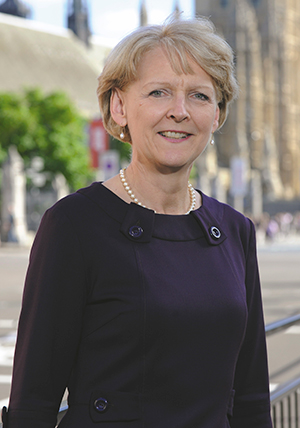 Barely a year after stepping down as chief executive of the British Property Federation, Liz Peace once again finds herself as the key interface between the property and public sectors.
Barely a year after stepping down as chief executive of the British Property Federation, Liz Peace once again finds herself as the key interface between the property and public sectors.
But where last time she was on the outside looking in, trying to influence the policymakers, this time she’s tasked with setting the direction herself.
The Comprehensive Spending Review published this week named Peace as shadow chair of a new body which will come to own the bulk of central government’s property estate – and the one in charge of selling off as much of it as possible.
It follows an announcement at the March Budget that the government planned to start charging departments market rents for the publicly owned freehold space they occupy.
The radical idea, designed to spur often recalcitrant and siloed civil servants into action to reduce the cost of their estates and free valuable assets which can be sold, needed a new body to oversee it.
And now Peace has the task of thrashing out exactly how that body should look.
“The government has said it wants to set up a property company to manage its assets. We are going to spend the next 15 months working out how to do it,” she says.
The new body won’t be in charge of property owned by the Ministry of Defence – which has its own Defence Infrastructure Organisation – or the Department for Health, which again has its own propco. But the land and buildings owned and occupied by every other central government department could be within its grasp.
Peace, a civil servant prior to joining the BPF, is keen to emphasise that the process has only just begun, and the whole point of her appointment was to find someone who knows how both public and private sectors work to turn the theory into practice.
As such, she says she will be drawing on her contacts in and knowledge of the property sector to bring in the “right advice” on how to unlock value from the vast government estate, at the same time as using her insider knowledge to work with departments to find solutions that work for them.
“If you get the right structure you incentivise (departments) to put their assets in to this body”, she says.
“And a share of the proceeds when they get sold.”
Peace was hired by cabinet office minister Matthew Hancock, in whose department the Government Property Unit sits.
The GPU will still exist she says, particularly given this new propco will only be responsible for central government assets and will not be tackling the vast local government estate.
Instead, chancellor George Osborne announced in the spending review that councils would be given powers to retain the full receipts of asset sales as a means of incentivising them emulate their central government peers and to offset the vast budget cuts that are coming their way.
“The GPU will still have a role,” says Peace. “But some of the functions will ultimately transfer into the company.”
Peace’s new job is very much as non-executive chairman of the body, which won’t actually come into existence until the spring of 2017, hence the “shadow” in her job title.
A recruitment process for a chief executive is therefore likely to begin next year, with the successful candidate likely to be someone with a proven track record as a highly effective asset manager.
The task for Peace now is to make sure that the departments buy in to the idea as much as possible, so the difficult politics of mentally separating civil servants from their prized Whitehall headquarters are taken care of before the serious business of asset sales gets under way later in the parliament.
She says ministers have already been in discussions with departments to get them on board with the idea.
But there is no question the scale of the challenge is enormous.
Questions such as whether or not the new body will automatically assume ownership of all central government property at launch are yet to be tackled says Peace, suggesting it will be a negotiation with individual departments.
“The issue about who controls the government estate has been there for decades,” she says.
“My husband’s reaction was that they were basically relaunching the Property Services Agency,” she adds, laughingly referring to the ill-fated central body which used to have control over the entire public sector estate and its capital projects.
The new body’s scope might not be quite that wide, but it seems likely that a sense of humour will come in handy regardless.











